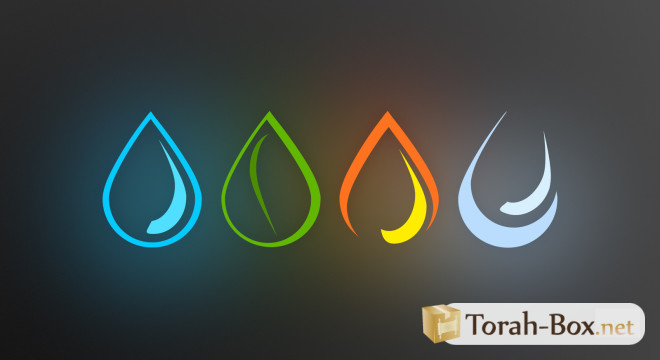
Women
Are You Rather Air, Earth, Fire or Water?
The society in which we live has a somewhat perverse tendency to define everyone by their material attributes: their physical appearance, their money, or their social status. But in reality, an individual is a much more complex and sophisticated world than the sum of all his material possessions. The very essence of a person's nefesh (character) is represented by their middot (character traits); for it is through these that man may aspire to draw closer to his Creator and to forge fruitful relationships.
But what exactly do middot represent? Midda in Hebrew means "measure," thus there is no "bad" midda, rather it depends on how the midda is used. In addition, the Tanya explains that the body is made up of four elements: fire, air, water and earth. Just as the body is made up of these four elements, the soul also contains these four forces, which represent the basis of our middot. Let us analyze each of them in order to better understand them and to perfect ourselves. This particularly concerns us women in that we will learn how to channel the strengths and weaknesses of our children to maximize their full potential.
Fire
Rebbetzin Tziporah Heller emphasizes that the instinct of fire is to return to its source. The heart of this trait is to cling to the meaning of life. The negative manifestation of this trait is arrogance and impudence, which stem from the insecurity caused by the lack of meaning. Anger is the sister of arrogance; it is just the next step. When a person's ego is hit, it indirectly affects their sense of importance and value.
The reverse of this midda is humility. Fire can be redirected, and the sense of meaning that a person feels is defined by the consciousness he has of other people. Self-abnegation and accepting that another person can shine are also part of the positive aspect of this midda.
Air
The ruach (breath) that Hashem breathed into Adam when He created him, refers, according to Onkelos, to speech. Thus, the need to express oneself is one of the vital needs of the human being. Rebbetzin Heller goes on to say that since speech equivalently uses soul and body, it best indicates our essence. The misuse of this midda is expressed by lies, fraud and self-aggrandizement. Conversely, the positive side of this character trait is the use of speech to emphasize another person's value. Prayer, study and encouraging words illustrate this.
Water
Water is the foundation of our survival and sustenance, and we have a need to take care of ourselves. This midda is corrupt when it manifests itself as jealousy of what others possess and in the pursuit of physical pleasures. On the contrary, this attribute is well channelled when we realize that any pursuit of physical pleasures leads to a drying up of the neshama. She is hungry! Thus, someone with this midda must be sure to "feed" his soul particularly well, with shiurim (Torah classes), kodesh (holy) books, or acts of kindness (all of which can be accomplished on Torah-Box!).
Earth
Finally, the peculiarity of the earth is that it cannot move by itself. It must be activated by an external force. Idleness and laziness are the negative sides of the element of earth. Depression and lack of motivation are also included. Lethargy comes from a fear of failure and the apprehension of never achieving anything in life.
The positive aspect of this trait is the acceptance of the assets and blessings that Hashem has showered upon us, and always use them wisely. Thus, an individual who has channelled this midda will know that everything G-d puts in his way can be overcome.
May we, women of Am Israel, know how to use our wisdom and our Bina (emotional understanding) to identify the various elements that lie in others, whether our husbands or our children, so that they will know how to use what they have in the best possible way!
Torah-Box.net Account
To access the entire Torah-Box.net website, sign up for free in less than a minute.
Weekly Parsha
 Candle Lighting - New York
Candle Lighting - New York
Friday February 20th, 2026 at 17:18 *Shabbat ends at 18:20 *
change my location
* Times given as an indication, check the times of your community








